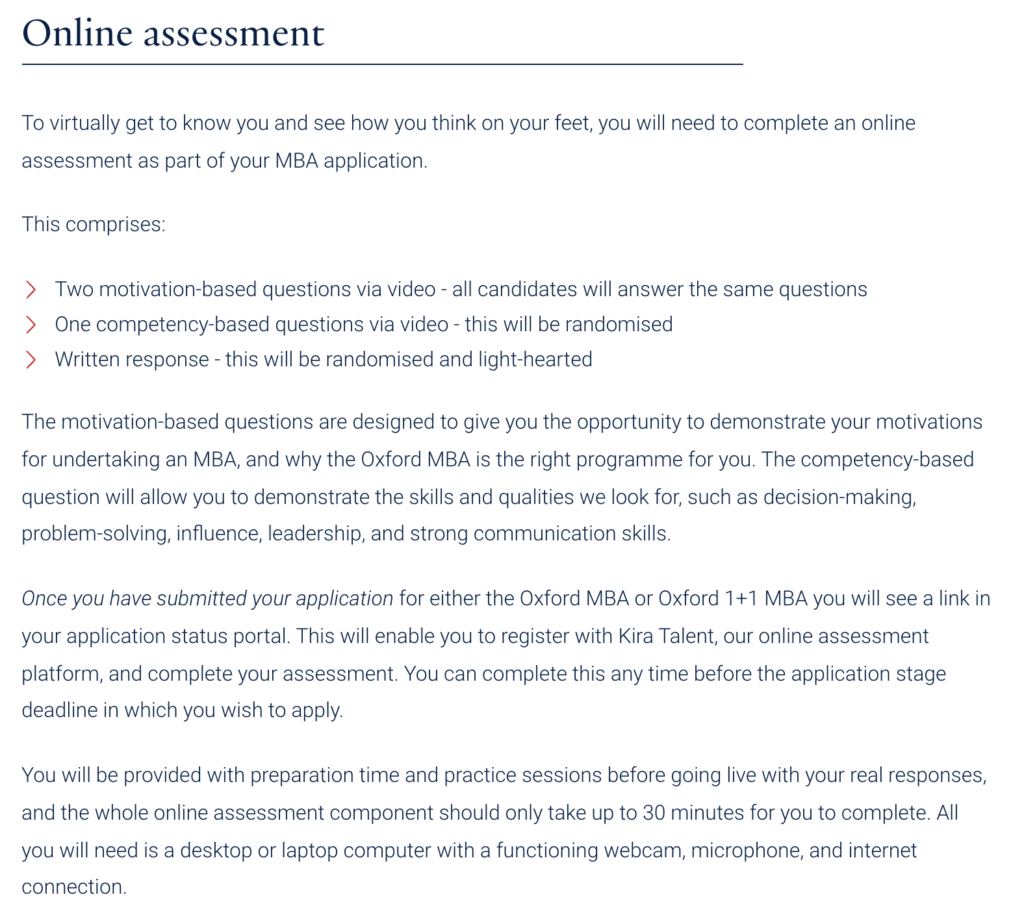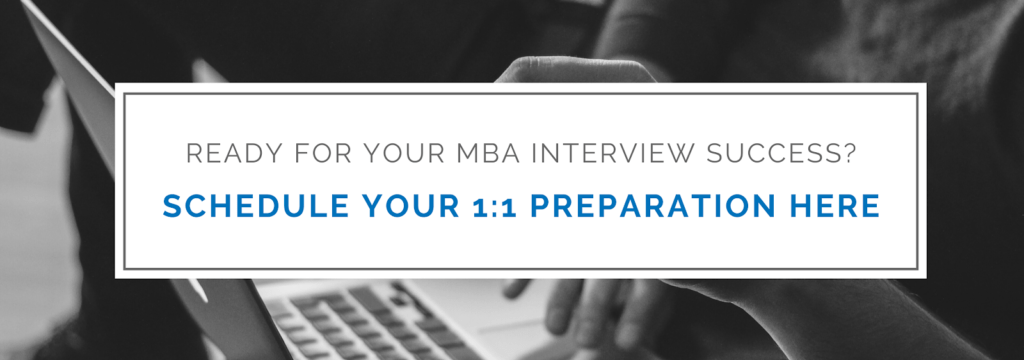With its focus on ethical leadership and social impact, Oxford is at the top of the list for an increasing number of applicants who seek to pursue (or continue pursuing) a high-impact, global career.
However, with impressive recruiting statistics and its unique 1+1 MBA + Master’s program, the competition to join Oxford’s elite MBA is more difficult than ever.
That’s why it’s so important to nail every aspect of your application – including the video interview.
In addition to giving the admissions committee the chance to “put a face with a name,” the video essay is an essential part of the Oxford Saïd application, as it allows committee members to determine if your communication style and values are a good fit with the Oxford community.
In fact, in our experience helping 99.8% of all our Oxford complete consulting applicants secure a place at the school, we have noticed that the video essay is just as influential in an applicant’s admissions decision as the admissions interview.
That’s why we’ve prepared this guide to help you understand how the Oxford video interview works and have shared our best tips to ensure you record an outstanding video essay that ensures you pass through to the interview round.
Why does Oxford require a video essay?
Launched relatively recently, the video interview gives the Oxford admissions committee the chance to truly “meet” candidates — as well as identify red flags in potential members of the school’s community.
According to Oxford’s admissions committee, the videos were introduced for these reasons:

With that in mind, it’s extremely important to make sure you fully understand this component of the application.
How does the Oxford video essay work?
The way the video essay works is very simple.
After submitting your application, you will receive an email from a company called Kira Talent. This email will contain a link that allows you to access the video essay platform.
After signing in and starting the session, you will get four spoken questions in total, one at a time. For the speaking questions, you will have to answer 2 questions from each of the 2 categories below:
- Motivation-based questions
- Competency-based questions
After receiving each question, you will have 1 minute to answer. There are no opportunities to redo the question, and you only get one chance to speak and provide your answer.
NOTE: Many of our clients have received 1.5 minutes to answer both motivation-based questions.
Then, you will receive one written question. You will receive a prompt and will have 5 minutes to answer. You’re expected to write about 250-500 words.
The questions are random, but we’ve included a list of questions previous applicants have received below, so you can practice!
Technical requirements
To complete the video interview, you need a microphone, camera, and strong internet connection. Though the platform states you can complete the video essay on your mobile device, we have found that this does not consistently work.
Furthermore, given past applicants’ issues with the iPad version of the application, we strongly suggest you record your answer on a computer.
If you do end up experiencing technical issues, access the support page here.
Deadlines

Regardless of when you submit your application, you need to submit your video essay response by your chosen round’s deadline. Once you submit the application, you will gain access to the Kira link to record your video interview. Don’t wait to submit your application last minute, however, since you will not receive extra time for your video interview! Find Oxford’s most current application deadlines here.
If you submit your application early, you can submit the video essays at any time, as long as you make the final deadline.
Which types of questions are asked?
Oxford asks 3 types of questions. 1 is motivation-based (spoken), 1 is competency-based (spoken) and one is written. We have included sample questions below.
Group 1: Motivation-based questions
The first group asks 2 questions related to your interest in Oxford, your reasons for completing an MBA, and your perceived benefits of their program.
This might take the form of “Why Oxford?”, or “Why is an MBA the next step for you to further for your career?” Conversely, they may also ask what you can contribute to the community or what types of activities you’re interested in pursuing outside of class. They obviously want to be sure that you have researched Oxford and have good reasons for applying.
For this section, refer back to your goals essay, reflect, and be honest with yourself about why you’re applying to Oxford. Maybe you like the international nature of the programme, maybe the timing of a 1-year program works well for you (or the 1+1 format, if you’re applying for this program), or perhaps you have colleagues who attended and spoke highly of Oxford.
The curriculum should also be a selling point for you, as well as the clubs and campus life, the diversity of the students, the experience of the teachers, and the internships and alumni network.
Now, please don’t reel off that list! It won’t be personal enough to you.
Instead, clearly articulate your top three or four reasons for applying to Oxford, and speak about them.
You don’t need to spend much time introducing this topic, saying “There are three main reasons why I want to attend Oxford” and then giving us the reasons is more than enough.
It’s always good to include something that shows you’ve researched the programme, so mentioning something specific, be it the academic modules or a specific club you want to join is a must for a winning video essay.
Sample motivation-based questions
- Why is an MBA the next step for you to further in your career?
- How long have you been considering doing an MBA and why now is the right time?
- What specific skills are you looking to gain at Oxford?
- What is unique to Oxford MBA that you are attracted to?
- Why an MBA now?
- Why Oxford Said Business School?
- Why Oxford over all the other schools you’ve applied to?
Group 2: Competency-based questions
Oxford is a community that values purpose-driven, adaptable people who work well in teams and are strong problem-solvers.
For that reason, Oxford often asks questions aimed at determining if you have the skills and qualities the school looks for and will be a positive addition to the Saïd community.
These questions won’t specifically ask “do you like working in a team,” but if you can keep in mind that this is a chance to show how you interact with others, you’ll have a good starting point for this question.
Typically questions range from how you help someone who needs advice, to your management style to how you handle conflict. An example of a type of question you might receive here would be, “Take a minute to tell us about a time where you’ve overcome a challenging situation, either professionally or personally. What was your approach to resolving the situation?”
To do well in this question, it’s great to draw on examples, and to be clear and to the point.

Furthermore, make sure to show your human side and demonstrate that you genuinely care for others and want teams you join to succeed. It can be easy to answer in a very conversational way, but doing so can often lead to an answer without a point, so make sure to structure the key elements of your answer.
For this question, you want to make sure you’re showing what you do, and use active language.
Your answer will want to show that you’re mature, that you’re emotionally intelligent, that you can see the bigger picture, that you’re empathetic and that you make a positive contribution to those around you.
If the question is about helping someone with a problem, tell us what you do. Perhaps you first like to listen, then help them get clear on what they really want, and then decide together on some next steps.
If the question is about your management style, be precise. Tell them how you manage people and why. Maybe you’re very hands-off, and like to give everyone the opportunity to take responsibility within their role, as you think this empowers them the most to learn and develop. Maybe you’re more hands-on and like to make sure your team knows they can come to you with problems, as giving people too much freedom too soon can actually be overwhelming to them.
Regardless, make sure to show your reasons for your actions and demonstrate that you’re a person who embraces collaboration and who sees setbacks as opportunities for learning.
Sample competency-based questions
- Take a minute to tell us about a time where you’ve overcome a challenging situation, either professionally or personally. What was your approach to resolving the situation?
- What is the most significant personal weakness that you have identified, what did you do about it, and what was the result?
- Imagine you are proposing a business innovation idea for a class project and the audience is not interested. What would you do?
- Discuss a time that you and your teammates were on a tight timeline.
- Tell us about a time you asked for help and how did it go?
- Tell us about a time you were overloaded with work, how did you handle it?
- What is the most significant personal weakness that you have identified, what did you do about it, and what was the result?
- Discuss what you would do if you and your teammates cannot come to an agreement on a project decision.
- Tell us a time where you had an idea and had to convince your project team.
- Tell us about a time you were overloaded with work, how did you handle it?
- Tell us about a time you led a diverse team, what specific skill did you use and why?
Group 3: Written question
Unlike other schools, you will also be required to complete a written question for the Oxford Video Interview. According to the Oxford Admissions Committee, “The question will allow you to demonstrate your written communication skills and how well you can think on your feet. It will be randomised, with applicants for the class of 2021-22 receiving one written-response question from a pool of available questions.”
Once you receive the question, you will have 5 minutes to complete your answer. You should expect to write about 250-500 words. We suggest leaving yourself ~30 seconds at the end to proofread since we all make typos!
One of the things students stress out the most is thinking about the potential questions they might receive here and if they are prepared enough to answer. However, these questions tend to be very light and are intended to be answered with no previous preparation. An example of a question you might receive would be, “Apples are more versatile than bananas. Discuss.”
TOP TIP: Remember there are no right answers for this question. Oxford simply wants to see how you communicate in writing and how you structure your thoughts. As long as you answer the question and have a clear flow from idea to idea, you’ve done a great job!
Sample written response questions
- Apples are more versatile than bananas. Discuss.
- What was your favourite book as a child and why?
- Why is night better than day?
- Is what we do today enough to solve climate change? Why or why not?
- Do you prefer cats or dogs and explain why?
- How do you describe the color red to someone who can only see in black and white?
The difference between a good and great video essay
Given the importance of the video essay in your Oxford application, it’s crucial to make sure you don’t just have a good video essay, but that you have a great video essay.
Now that you’ve learned how the video essay will work, we’ve gathered our top 3 tips to ensure your video essay performance brings you one step closer to reaching your goal of attending Oxford.
Tip 1: Be personable on camera
This is quite a specific skill to master, but with a bit of practice, it will get much easier.
My best tip for you is to practice recording yourself and time yourself as well. Go through the questions you have and record yourself answering for one minute.
If you mess up, keep going. You can’t stop and try again in the real thing, so don’t do it now. Continue your answer and fake confidence if necessary!
Then watch yourself back. Were you making eye contact with the camera? Did you smile? Did you look friendly? Bored? Annoyed? Scared?
Chances are the first few you do won’t be great but keep going. Remember that Oxford is looking for friendly people to join their community, so make sure you’re showing your true colors on camera.
You might also like to pretend you’re something of a TV presenter. This can help you to bring your personality forward and be more engaging. You don’t want to seem flat in the recording, so be a little bit brighter and friendlier than you think you need to be, and see how big of a difference it makes to your recordings.
Furthermore, be extremely careful with your tone of voice and body language. If you’re slumped over or look bored, the admissions committee will get the impression you’re not engaged with the task or, worse, that you’re not passionate about Oxford!
This also goes for your tone of voice. Passion is contagious, but the last thing we think of when imagining a passionate person is a monotone, bored voice. So vary your tone of voice and make sure to project your passion for your interests and for Oxford. If you’re not naturally good at this, you may want to seek out help from friends or record yourself multiple times until you’ve nailed the brief.
You’ll also want to be strict with yourself about timing. Don’t go over, you won’t get to do that for real. If you find you’re running out of time, a good place to look is to see if you’re taking too long to get started with the answer, or if you’re trying to say too much.
Cut out long introductions, and stick to a few points per answer.
But most importantly, don’t forget to smile! Though this may sound cliché or outdated, smiling really is one of the best — and easiest — ways to be memorable and to create a positive first impression.
Tip 2: Be prepared to think on your feet

With the timer counting down and no option to check your interviewer’s body language for subtle clues about how well your answer is being received, video essays can be incredibly challenging.
Even more so when you receive a question you weren’t prepared for!
Yet receiving a curveball question is no reason to panic, since the best way to handle this situation is through a mix of preparation and being spontaneous.
A good way to avoid completely drawing a blank is to have a few solid examples you’re ready to speak about and adapt.
For example, let’s say you recently worked on a project in a foreign country. You experienced culture shock while trying to adapt to the new city, faced linguistic challenges both in the office and in your daily life, and also had to mix up your work style to align with local expectations. This experience would be a fantastic “stock” answer to have ready, since it brings in so many different topics that you can adapt the focus based on what the question asks.
So, in addition to preparing your answers to the list of questions we’ve prepared for you below, think back on your life and career and write a list of defining moments that are broad enough to be adapted to various questions and that show your fit with the Oxford community and its values.
While delivering your answer, don’t let the admissions committee in on the little secret that you got caught off guard! Answer confidently, using your tone of voice and body language to show off your winning personality and you’ll have successfully overcome the challenge!
TOP TIP: The admissions committee knows you’ll be a little nervous during the video essay, so don’t beat yourself up if you feel you portrayed this in your video essay. However, if you tend to get extremely nervous or freeze up, make sure to practice extra hard to make sure this doesn’t happen during your official recording.
Here at Ellin Lolis Consulting, we also offer video essay training sessions with our team of interview experts who focus on helping you adjust your body language and tone. Schedule your free consultation to get personalized help with your video essay!
Tip 3: PRACTICE
As the saying goes, practice makes perfect. And if Barack Obama still practices his speeches, chances are you should practice too!
For the video essay, we suggest several types of practice to ensure you really nail the actual recording.
First, rehearse delivering your answers. We’ve all experienced situations where we had the perfect answer in our head, only to have it spill out in a disorganized mess when we tried to actually communicate the answer. This is more common than you’d think, so make sure you’ve “test-driven” your answers at least once.
During this phase, receiving feedback from an expert can help you polish your answers, making sure they show you off and demonstrate you have a strong “fit” with Oxford. Our team of experts has successfully helped all but one of our Oxford complete consulting candidates secure admissions to the school, so you can count on our team of interview experts to make sure you’re camera-ready!
Finally, Oxford offers you the chance to go through practice questions on the platform itself. This is a great chance to both make sure your equipment is properly set up and to get a feel for the timing and flow of the real video essay. Though we suggest you prepare extensively before reaching this step, make sure you don’t skip this extra chance to prepare!
Make sure you shine
You have stressed about every aspect of your Oxford application, and now you are ready to record your video essay! With the right preparation, this can be your chance to shine and get a highly-coveted spot at Oxford.
However, maybe you don’t know where to start in preparing, or maybe you ramble on and lose your focus while answering. Maybe you’ve even downloaded the sample questions and written out your answers. The problem is, when you try to apply these templates to your own story, it doesn’t quite work.
Our video essay prep focuses on helping you determine how to present yourself to Oxford while using appropriate, impact-driven language without being artificial, or worse, robotic.
That’s why we are so proud of our video essay preparation. Focused on helping you overcome your individual strengths and weaknesses in navigating the video format, all while helping you tell your story, ensures that you’ll put your best foot forward when you click “record” for your Oxford Saïd essays!
Want to put the Ellin Lolis advantage to work for you?
Schedule your preparation session with our team of interview experts today!
Real MBA Essays That Got People In
School-specific sample essays that got our clients accepted






